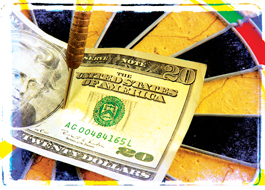home | metro silicon valley index | features | silicon valley | feature story

Cheaters Drink Free
A former con man reveals the bar bets that can't lose
By Steve Palopoli
DRINKING on the cheap? Big deal. Spending money on drinks is for losers anyway. Making money on drinking is where it's at.
Just ask Simon Lovell. The former con-man turned magician wrote the indispensable book How to Cheat at Everything: A Con Man Reveals the Secrets of the Esoteric Trade of Cheating, Scams and Hustles so his readers could do just that.
Well, he wrote it for a lot of reasons, and ironically, it's more important as a defensive bible (that is, how to protect yourself from the encyclopedia of scams within) than as an offensive playbook. The vivid exposés of street hustles, card schemes, carny fixes and Internet scams are fascinating, but Lovell's detailing of the dangers to life and liberty make it obvious that readers should not try them at home.
There is one exception, and that's bar bets. That chapter is so addictive that I couldn't stop myself from using it to con friends out of a buck here or there for months after reading it. Lovell suggests playing for drinks, which means you can at least reduce your fiscal footprint for a night of drinking to zero.
He breaks the bets down into different types: proposition bets, odds bets and NAP (Not A Prayer) bets, but what stays the same is the near impossibility of losing. Most don't require any sleight of hand skill, but they do require a bit of selling on the hustler's part so that the marks never figure out what hit them.
"It's odd," Lovell told me in an interview about the psychology of the con, "because you get on a roller coaster. Now, if I say to you at the end of a roller coaster, 'How many ups and downs were there, how many turns were there?' you'd probably say 'I have no idea, but it was a great roller coaster.' And that's the way cons work. Once you're on the roller coaster, once you're out of line and you're in that little car, you've totally lost control."
Just as a taste, here are a couple of my favorites from the book. Keep in mind, these are all meant to be performed in fun, preferably among friends. There's so much entertainment value to them that no one I've met has minded losing a buck or two. Unlike bigger cons, they're harmless, and everyone gets a laugh at the punch lines.
In "The Swallow," you bet the mark that he can't do everything you do for the next 90 seconds (actually, I've found that 60 seconds works better for me so I have less time to keep from cracking up). You reassure him that you won't use any contortionist movements or anything like that—you'll only be doing things that can be replicated by a normal person. Make sure there's a glass full of water near each of you. Then put a match in front of you on the table and one in front of the poor, unsuspecting sap—uh, I mean in front of your pal. Say go.
As time ticks away, you begin to work. You flip the direction of your match. He does so, as well. You take a drink obnoxiously from your glass. He takes one from his. Move the match around some more. He'll follow suit. And so on, until just before time is up, when you take a second sip from the glass and swallow. So does he. You set down the glass. So does he.
Time is almost up! Are you going to lose? Nope, because this time you held a little bit of the water in your mouth when you took a sip, and now you spit it back into the glass. Since he swallowed all of his, he can't, and you win the bet. Next!
For the "Six Glass Scam," you line up six shot glasses on the bar. Fill the first three and leave the second three empty. Then bet that, by only moving one glass, you can get the glasses alternated—full, empty, full, empty, full. Most people will say "no way," but after they take the bet, pour the contents of the middle full glass into the middle empty glass, and voila!
Personal note on this one: I've noticed that if you're doing "Six Glass Scam" with a friend, and he or she knows you're on a cheaty-bar-bet kick lately, they'll be looking for a solution and might figure it out if you're not fast enough. Again, selling it is the key. I've found that if you make a big deal about sliding the glasses on the bar when you're first moving them around, and never lift them up in the air, they'll stay stumped long enough for you to pull it off. But if you make the mistake of lifting a glass to move it somewhere while you're setting up the bet, it could clue them in faster.
These examples barely scratch the surface of what Lovell has to offer in How to Cheat at Everything. He reminds everyone to work with patience, keep it all in fun, and don't get greedy—especially with your friends.
"You can only kill a sheep for meat once," he says. "But you can shear it for wool once a year."
Send a letter to the editor about this story.
|
|
|
|
|
|